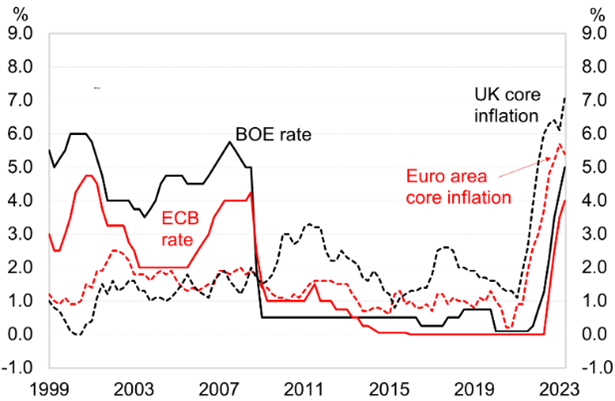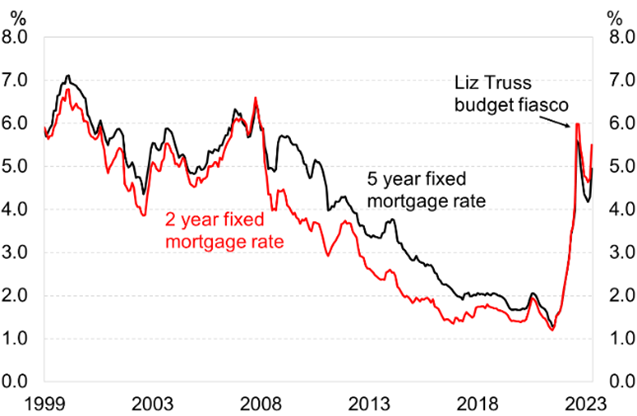King Charles and Queen Camilla were crowned in Westminster Abbey on May 6th, with a sumptuous ceremony that delighted the planetary watching crowd. Britons who were celebrating the bestowal of the crown upon Charles III with coronation quiche, scones and booze, paid 25 percent higher prices for food since 2019. Economists at the London School of Economics (LSE) estimate that in the absence of Brexit this figure would be about 8 percent lower, meaning that since 2019 British households overall paid an extra GBP 7bn for food, according to the study.

Incidentally, this fact may help explaining why optimism for the expected benefits of Brexit has faded away and the issue of leaving the EU remains bitterly divisive among Britons. Post-Brexit trade restrictions affected the prices of specific food products imported from the EU amplifying the structural drivers of high inflation in the UK: strong demand, fueled by accommodating fiscal and monetary policies in support of the economy after Covid and energy prices shocks, and weak constrained-supply, due to the tight UK labor market.
The UK government and the Bank of England (BoE) are not alone in facing high inflation and lower growth among western industrialized economies.
However, the UK economy is an outlier, and not in a positive way, among the G7 countries. The consensus forecasts for 2023 UK GDP growth are the lowest among the G7 countries and the UK core inflation is expected to be the highest among the peer countries, after jumping to 7.1 percent in May (see Chart 1), in contrast with decelerating core inflation in the euro area and in the US.
Chart 1: BoE and ECB reference rates, UK and euro area inflation.
Source: Bloomberg, MBaer calculations. ECB Main Refinancing Operations Rate, BoE Official Bank Rate, UK core CPI YoY, euro area core inflation YoY
The BoE, alike the Fed's and the ECB's overly delayed tightening, has been rapidly hiking rates from zero in December 2021 up to the current level of 5 percent. The BoE admitted that recent inflation figures have been hugely underestimated, as their models did not capture the inflation shock, which resulted in an external review of the BoE inflation forecasting process.
After hiking 50bps in June, BoE Governor Andrew Bailey has hinted at further hikes. As the real rate is currently negative, at minus 2 percent, it is hardly surprising that markets expect the BoE to hike rates above 6 percent by year-end. The Taylor rule mechanically says the interest rate should be set at above 10 percent. No poppycock, the BoE will have to hike rates again.
Gobsmacked borrowers
The surge in interest rates is driving mortgage rates up and will put more financial pressure on mortgage holders, as cheap fixed mortgage rates gradually expire. Two years ago, borrowers could fix their mortgage for 2 years at about 1.3 percent and now they can borrow at about 5.5 percent (see Chart 2). Mortgage rates rose sharply to 6 percent last year – due to PM Liz Truss' budget fiasco, which led to her resignation just 44 days after taking over from Mr. Boris Johnson –– and then started rising reaching the current 5.5 percent level, driven by BoE's rate hikes.
Chart 2: UK mortgage rates are rising sharply.
Source: BoE 2-year and 5-year (75% LTV) fixed rate mortgage
Basic calculations show that borrowers currently looking at refinancing a 2-year mortgage for a 30-year loan will face an increase of about 75 percent of their mortgage payments. This is worrying, as the majority of fixed rate mortgages in the UK coming up for renewal in 2023 were fixed at interest rates below 2 percent, according to the Office for National Statistics. Because of the increasing borrowing costs, UK house prices are falling at their fastest annual pace since 2011 and housing market activity is likely to slow severely. Given the economic constraints from the supply side, the BoE made it clear that it will keep on hiking, hoping to achieve the 2 per cent inflation target, which will result in a sharp slowdown of the economy and potentially a recession.
Mr. Bailey may wish to have the King's Stone of Destiny and the Sword of Spiritual Justice to rule the UK economy, but he can only move interest rates and buy bonds through quantitative easing. We expect up to four additional interest rates hikes, persistent high inflation and a recession in the UK.
Francesco Mandalà, PhD, Chief Investment Officer



